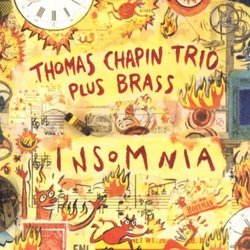| All Artists: Thomas Chapin Trio Plus Brass Title: Insomnia Members Wishing: 0 Total Copies: 0 Label: Knitting Factory Release Date: 8/2/1994 Genres: Folk, Jazz, Special Interest, Pop Styles: Avant Garde & Free Jazz, Modern Postbebop, Swing Jazz, Bebop Number of Discs: 1 SwapaCD Credits: 1 UPCs: 035828013222, 035828001328 |
Search - Thomas Chapin Trio Plus Brass :: Insomnia
 | Thomas Chapin Trio Plus Brass Insomnia Genres: Folk, Jazz, Special Interest, Pop
|
Larger Image |
CD Details |
CD ReviewsFABULOUS! 12/07/1999 (5 out of 5 stars) "This older release from Thomas Chapin is just fabulous. Like all other examples of this composer/player's offerings, Insomnia is quality modern jazz. The horn combinations are exciting and sweetly melodic. The range of moods on this album is perfect and will enrich any hour in which an ear is lent to it. Each track is beautifully composed and performed. The musicianship is simply amazing. I never tire of this record." Chapin with brass. Michael Stack | North Chelmsford, MA USA | 11/04/2005 (2 out of 5 stars) "Probably my least favorite piece by Thomas Chapin, "Insomnia" is billed as the Thomas Chapin Trio Plus Brass-- an accurate band name. Chapin's working band (Chapin on alto sax and flute, Mario Pavone on bass and Michael Sarin on drums) were augmented by five brass horns-- trumpeters Al Bryant and Frank London, trombonists Curtis Fowlkes and Peter McEachern, and tubaist Marcus Rojas (with Ray Stewart on tuba on one cut). The result are a mixed bag.
Admittedly, I've never been fond of the whole avant-garde big band sound-- large band recordings by the likes of Cecil Taylor never did anything for me, for example, and Chapin's stab at it feels much the same. Essentially, he extends his idiom to a larger ensemble with the high brass doubling his voice and the low brass doubling the bass voice. Sometimes the harmonies and arrangements are intriguing, but by and large cuts like "Equatoria" feel cluttered compared to what a trio reading would sound like. Oddly enough, extended cut "Golgotham" seems to find a way to work, with cleverly organized harmoneis and some fantastic performances throughout. There are two trio cuts on the record, cleverly titled "Trio I" and "Trio II"-- the former is an excursion into free jazz, with Chapin railing on alto, calling forth shades of Albert Ayler in the collective trio improv. the latter is a brief flute-over bass and drums piece, the sort of minimalist excursions on flautist led jazz trio that Chapin often did which, again, I never found particularly engaging. Newcomers to Chapin's music are encouraged to check out some of his other albums, but this one I'd save for fans only." |

 Track Listings (8) - Disc #1
Track Listings (8) - Disc #1